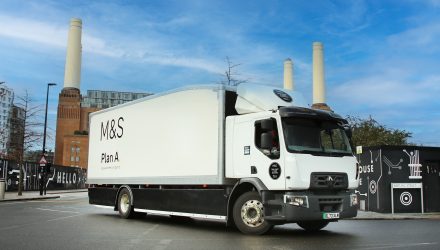
Euro6 technology has fixed scenes like this
Billions invested in new diesel tech, but 70% of trucks and just 20% of buses registered boast it.
Today the SMMT is bringing together transport policy makers, vehicle manufacturers and other stakeholders from across the UK at a special event in London to discuss the future contribution of commercial vehicles to improving air quality.
UK manufacturers have already invested billions of pounds in advanced diesel technology to meet the latest European emissions standard known as Euro-6. These diesel vehicles have filters that capture 99% of harmful soot particulates, while exhaust after treatments drastically reduce emissions of Nitrogen Oxides (NOx).
However, despite these benefits, and the fact that Euro-6 technology has been an EU requirement for heavy duty vehicles since the beginning of 2014, less than three-quarters of commercial vehicles and just a fifth of buses registered in the UK last year were fitted with it because of a loophole that allows bus operators here to specify older vehicles for their fleets.
By closing this loophole and supporting the uptake of the latest Euro-6 buses, government and local councils have the opportunity to reduce pollution dramatically, and avoid paying hundreds of millions of pounds in fines that will be levied by the EU if air quality obligations are not met.
Mike Hawes, SMMT Chief Executive, said, “It’s time to stop demonising diesel, and for all stakeholders to engage on this issue. Government and local councils must work together with industry and operators to encourage widespread adoption of the latest diesel technology that has the potential to make a dramatic improvement to air quality in the UK. We hope today’s debate will mark the start of that dialogue.”
Today’s Improving Air Quality: The Commercial Vehicle Contribution event, hosted by SMMT in London, will showcase the latest low emission diesel technology and open the debate on how transport officials, industry, business and passenger groups can work together to encourage new diesel uptake and develop integrated and sustainable policies that will ensure the UK delivers on its emissions targets at national and local levels.





